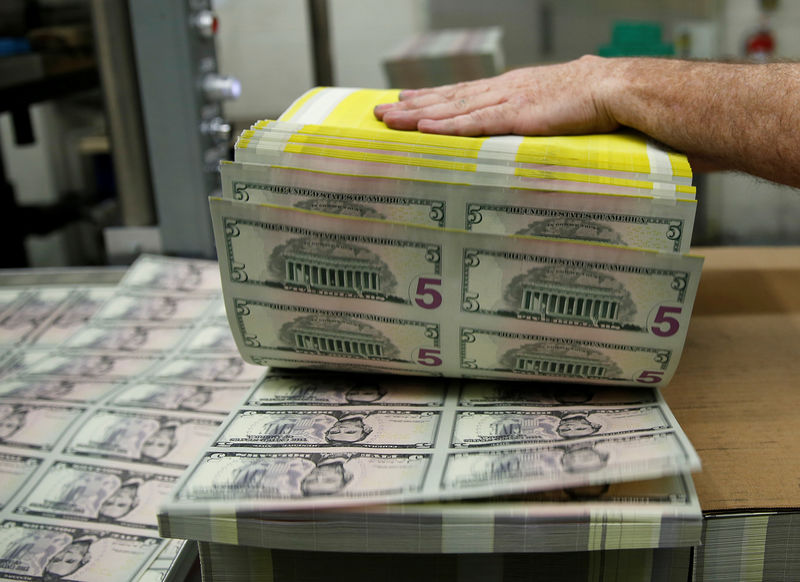Navitas stock soars as company advances 800V tech for NVIDIA AI platforms
Investing.com - The U.S. dollar fell Friday, on course for a losing week on concerns over the country’s fiscal health as President Donald Trump’s tax bill moves through Congress.
At 05:00 ET (09:00 GMT), the Dollar Index, which tracks the greenback against a basket of six other currencies, fell 0.6% to 99.295, on track for a weekly loss of around 1.6%, snapping a four-week winning streak.
Dollar slips on fiscal health worries
The House of Representatives passed Trump’s tax and spending bill with only one vote to spare on Thursday, and it now goes to the Senate, where more heated debate is likely.
That said, the Republican Party holds the majority in the Senate, and the bill’s passage into law looks likely, potentially adding $3.8 trillion to the federal government’s $36.2 trillion in debt.
Moody’s last week downgraded its U.S. debt ratings, citing the country’s hefty debt pile, and the United States’ worsening fiscal health has hit the dollar hard.
Worries about the cost of the measure – and its impact on the nation’s debt and deficit – sent long-term Treasury yields higher. The 30-year Treasury bond yield touched a high of 5.161%, its highest level since October 2023, while the 10-year Treasury note breached 4.6%.
“Concerns remain over U.S. Treasurys this summer, as evidenced by the U.S. ten-year swap spread still trading wide at 55bp,” said analysts at ING, in a note. “We’re also following the high-frequency data when it comes to foreign official holdings of U.S. Treasuries. Fed custody holdings data suggest these fell $10bn in the week to Wednesday, marking a $30bn drop since the start of April. We’re all really waiting for the April U.S. TIC data, released mid-June, which will tell us which country sold what in April.”
Euro boosted by German economic growth
In Europe, EUR/USD traded 0.5% higher to 1.1338, boosted by data showing that the German economy grew significantly more in the first quarter than previously estimated.
The German economy expanded by 0.4% compared with the previous quarter, ahead of the preliminary reading of 0.2% growth.
Germany’s sluggish economy has not grown at that pace since the third quarter of 2022, when it expanded by 0.6%, and actually contracted in the final quarter of last year by 0.2%.
“We think the euro is continuing to benefit from being the most liquid alternative to the dollar,” ING added.
GBP/USD rose 0.5% to 1.3490, boosted by the news that British retail sales jumped in April by a much stronger than expected 1.2% month-on-month, after a downwardly revised 0.1% increase in March.
The increase marked the fourth back-to-back monthly rise in retail sales - a feat last achieved in 2020, when consumer spending rebounded after the first COVID-19 lockdown.
Yen gains ahead of Q1 GDP
In Asia, USD/JPY traded 0.5% lower to 143.32, with the Japanese yen set to gain nearly 1.5% against the dollar this week.
Data on Friday showed that Japan’s core consumer inflation accelerated to 3.5% year-on-year in April 2025, surpassing market expectations of 3.4% and marking the fastest pace in over two years.
A more refined measure of inflation, the core CPI, which excludes both fresh food and energy, also edged up to 3.0% in April from 2.9% in March.
USD/CNY traded 0.2% lower to 7.1887, in muted trading.
